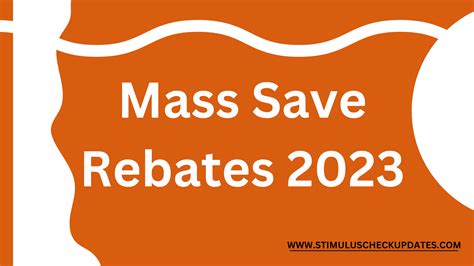The world of energy efficiency programs continues to evolve, with Mass Save leading the charge in Massachusetts. As residents become increasingly aware of the importance of energy conservation, the available rebates have become a crucial tool for families and individuals looking to reduce both their energy consumption and costs. In this article, we will explore the latest updates on Mass Save rebates for 2023, how they can help maximize your savings, and what to expect as the year unfolds.
What is Mass Save?
Mass Save is a collaborative initiative sponsored by Massachusetts’ gas and electric utilities and energy efficiency service providers. This program aims to promote energy efficiency and help residents and businesses save money on energy bills while reducing greenhouse gas emissions. Through a variety of rebates, incentives, and services, Mass Save makes it easier for consumers to make energy-efficient upgrades to their homes.
Latest Updates on Mass Save Rebates for 2023
As we move into 2023, several changes and new offerings have been introduced under the Mass Save program:
Increased Rebates for Home Energy Improvements
This year, Mass Save is offering significantly increased rebates on energy-efficient appliances and home improvement projects. Homeowners can benefit from:
- Heating and Cooling Systems: Up to $10,000 in rebates for qualified air source heat pumps and central air conditioning systems.
- Insulation and Air Sealing: Rebates ranging from $1,000 to $2,000 for homeowners who undertake insulation upgrades.
- Smart Thermostats: Up to $100 back for purchasing and installing energy-efficient smart thermostats.
Expanded Eligibility for Rental Properties
In a push to make energy efficiency accessible to more residents, Mass Save has expanded its eligibility criteria for rental properties. Landlords are now encouraged to participate, which could lead to enhancements in rented units that benefit both property owners and tenants.
Increased Funding for Low-Income Households
This year, Mass Save has allocated additional funding specifically for low-income households to ensure that financial barriers do not prevent access to energy efficiency improvements. These households may qualify for 100% financing for insulation and heating upgrades, meaning little to no out-of-pocket expenses.
How to Navigate the Mass Save Program
Taking advantage of the Mass Save rebates can be a straightforward process if you follow these steps:
1. Assess Your Home’s Energy Needs
Start by conducting an energy assessment. Mass Save offers no-cost home energy assessments that help identify areas where you can improve energy efficiency. This assessment is a valuable first step in understanding which upgrades will be most beneficial.
2. Explore Available Rebates
After the assessment, the advisor will provide a tailored list of suggestions along with associated rebates. Be sure to review all available options, which can include everything from insulation to ENERGY STAR® appliances.
3. Work with Approved Contractors
Mass Save works with an extensive network of approved contractors. Choose a contractor from this list to ensure you receive the maximum allowable rebates and have peace of mind that the work will meet their guidelines.
4. Submit Your Rebate Application
Once the work is completed, submit your rebate application. Most rebates can be processed quickly, allowing you to see the savings on your next energy bill.
Looking to the Future: Trends in Energy Efficiency
As awareness of climate change grows, more residents are motivated to invest in energy efficiency. Here are a few trends to watch in 2023 and beyond:
1. Electrification of Heating Systems
More homeowners are looking to electrify their heating systems by switching from gas to electric heat pumps. Mass Save supports this transition with attractive rebates that can help offset initial costs.
2. Sustainability-Focused Upgrades
Consumers are more interested in sustainable building materials and energy-efficient technologies. This creates opportunities for rebate programs to include incentives for renewable energy installations, such as solar panels.
3. Community Engagement and Awareness
Public campaigns will continue to boost awareness of energy-efficient practices and the Mass Save program itself. Events, workshops, and online resources aim to educate communities on how to maximize efficiency and savings.
Conclusion
Mass Save remains a vital resource for Massachusetts residents looking to improve their energy efficiency and save on energy costs. With increased rebates and expanded programs for both homeowners and renters, there has never been a better time to explore what Mass Save has to offer. By participating in the program, individuals and families can make a positive impact on their energy bills while contributing to a more sustainable future. Don’t miss out on the opportunity to unlock significant savings—take action today!
FAQs
What is the Mass Save program?
Mass Save is a Massachusetts initiative that provides rebates and incentives to encourage energy efficiency among residents and businesses.
Who is eligible for Mass Save rebates?
Mass Save rebates are available to homeowners, renters, and landlords. Recent changes have specifically expanded eligibility for rental properties and low-income households.
How do I apply for a Mass Save rebate?
To apply for a rebate, you must first complete a home energy assessment. Afterwards, you can work with an approved contractor and submit your rebate application after the work is complete.
What types of rebates are available?
Mass Save offers rebates on various improvements, including heating and cooling systems, insulation, air sealing, and smart thermostats.
Is there a cost for the initial energy assessment?
No, Mass Save offers no-cost energy assessments for homeowners to identify energy-saving opportunities.
Download Mass Save Rebate Status
